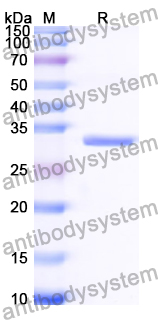Catalog No.
YHN47801
Expression system
E. coli
Species
Homo sapiens (Human)
Protein length
Thr27-Lys292
Predicted molecular weight
32.59 kDa
Nature
Recombinant
Endotoxin level
Please contact with the lab for this information.
Purity
>90% as determined by SDS-PAGE.
Accession
Q9UH77
Applications
ELISA, Immunogen, SDS-PAGE, WB, Bioactivity testing in progress
Form
Lyophilized
Storage buffer
Lyophilized from a solution in PBS pH 7.4, 0.02% NLS, 1mM EDTA, 4% Trehalose, 1% Mannitol.
Reconstitution
Reconstitute in sterile water for a stock solution. A copy of datasheet will be provided with the products, please refer to it for details.
Shipping
In general, proteins are provided as lyophilized powder/frozen liquid. They are shipped out with dry ice/blue ice unless customers require otherwise.
Stability and Storage
Use a manual defrost freezer and avoid repeated freeze thaw cycles. Store at 2 to 8°C for frequent use. Store at -20 to -80°C for twelve months from the date of receipt.
Alternative Names
Kelch-like protein 3, KLHL3, KIAA1129
Evidence for Functional Regulation of the KLHL3/WNK Pathway by O-GlcNAcylation., PMID:40060460
Camk2n1 deficiency reduces the NaCl cotransporter activity through the CUL3/KLHL3/WNK4 complex in the kidney., PMID:39798916
Familial Hyperkalemic Hypertension., PMID:39699086
Genetics of Cardiac Aging Implicate Organ-Specific Variation., PMID:39148824
Regulating distal nephron functions and salt sensitivity., PMID:39024355
Increased Expression and Prognostic Significance of BYSL in Melanoma., PMID:38980088
Identification of Potential Neddylation-related Key Genes in Ischemic Stroke based on Machine Learning Methods., PMID:37910287
Hereditary causes of hypertension due to increased sodium transport., PMID:37909881
A Spanish Family with Gordon Syndrome Due to a Variant in the Acidic Motif of WNK1., PMID:37895227
Dysregulation of the WNK4-SPAK/OSR1 pathway has a minor effect on baseline NKCC2 phosphorylation., PMID:37881876
Phenotypic but not genetically predicted heart rate variability associated with all-cause mortality., PMID:37803156
Association of Familial Hyperkalemia and Hypertension with Proximal Renal Tubular Acidosis and Epileptic Seizures., PMID:37666233
KLHL3-dependent WNK4 degradation affected by potassium through the neddylation and autophagy pathway., PMID:37481568
Identification of a novel KLHL3-interacting motif in the C-terminal region of WNK4., PMID:37285722
Genomic approaches to identify and investigate genes associated with atrial fibrillation and heart failure susceptibility., PMID:37270590
Identification and validation of autophagy-related genes in Kawasaki disease., PMID:37085930
Renal effects of cullin 3 mutations causing familial hyperkalemic hypertension., PMID:37070483
The serine-threonine protein phosphatases that regulate the thiazide-sensitive NaCl cotransporter., PMID:36875042
NCC regulation by WNK signal cascade., PMID:36685207
Chloride-sensitive signaling turns the potassium switch on., PMID:36272750
KLHL3 deficiency in mice ameliorates obesity, insulin resistance, and nonalcoholic fatty liver disease by regulating energy expenditure., PMID:36028759
Cullin 3 mutant causing familial hyperkalemic hypertension lacks normal activity in the kidney., PMID:36007890
WNK1 in the kidney., PMID:35894282
Multiple molecular mechanisms are involved in the activation of the kidney sodium-chloride cotransporter by hypokalemia., PMID:35870644
Generation and analysis of pseudohypoaldosteronism type II knock-in mice caused by a nonsense KLHL3 mutation in the Kelch domain., PMID:35621709
Kelch-like protein 3 in human disease and therapy., PMID:35585379
A viral interferon regulatory factor degrades RNA-binding protein hnRNP Q1 to enhance aerobic glycolysis via recruiting E3 ubiquitin ligase KLHL3 and decaying GDPD1 mRNA., PMID:35538151
Using biological information to analyze potential miRNA-mRNA regulatory networks in the plasma of patients with non-small cell lung cancer., PMID:35313857
Sequence and structural variations determining the recruitment of WNK kinases to the KLHL3 E3 ligase., PMID:35179207
A Novel Homozygous KLHL3 Mutation as a Cause of Autosomal Recessive Pseudohypoaldosteronism Type II Diagnosed Late in Life., PMID:35093948
Combined Kelch-like 3 and Cullin 3 Degradation is a Central Mechanism in Familial Hyperkalemic Hypertension in Mice., PMID:35064051
Familial hyperkalemic hypertension: hyperkalemia not hypertension defines dominant KLHL3 disease and may permit earlier recognition and tailored therapy., PMID:35000137
Novel CUL3 Variant Causing Familial Hyperkalemic Hypertension Impairs Regulation and Function of Ubiquitin Ligase Activity., PMID:34878901
[A Case of Pseudohypoaldosteronism Type Ⅱ (PHA2) Caused by a Novel Mutation of KLHL3]., PMID:34622611
Gordon syndrome caused by a CUL3 mutation in a patient with short stature in Korea: a case report., PMID:34480842
Dysfunction of Cullin 3 RING E3 ubiquitin ligase causes vasoconstriction and increased sodium reabsorption in diabetes., PMID:34343486
A rare case of persistent hyperkalaemia., PMID:34159796
Regulatory control of the Na-Cl co-transporter NCC and its therapeutic potential for hypertension., PMID:34094823
Genotype-phenotype correlation in Gordon's syndrome: report of two cases carrying novel heterozygous mutations., PMID:34089516
A case report of pseudohypoaldosteronism type II with a homozygous KLHL3 variant accompanied by hyperthyroidism., PMID:34022862
Downregulation of Cullin 3 Ligase Signaling Pathways Contributes to Hypertension in Preeclampsia., PMID:33928137
Role of KLHL3 and dietary K+ in regulating KS-WNK1 expression., PMID:33682442
Phosphorylation regulates cullin-based ubiquitination in tumorigenesis., PMID:33643814
Decreased KLHL3 expression is involved in the activation of WNK-OSR1/SPAK-NCC cascade in type 1 diabetic mice., PMID:33432425
The sodium/proton exchanger NHA2 regulates blood pressure through a WNK4-NCC dependent pathway in the kidney., PMID:32956652
Mutation affecting the conserved acidic WNK1 motif causes inherited hyperkalemic hyperchloremic acidosis., PMID:32790646
WNK-SPAK/OSR1-NCC kinase signaling pathway as a novel target for the treatment of salt-sensitive hypertension., PMID:32724175
Novel KLHL3 Variant in an Infant With Gordon Syndrome., PMID:32462939
The WNK signaling pathway and salt-sensitive hypertension., PMID:32286498
Hypertension-causing cullin 3 mutations disrupt COP9 signalosome binding., PMID:31813255


